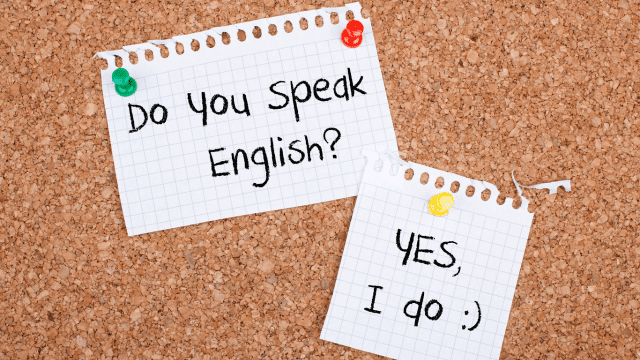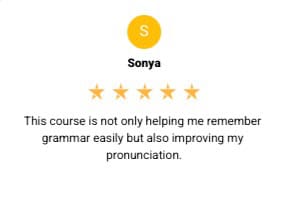5 Simple But Effective English Pronunciation Hacks
👇 Take this lesson with you! 👇
Table of Contents
The importance of pronunciation
I want to show you how to improve your English pronunciation in 3 weeks, with 5 simple but effective pronunciation hacks.
Pronunciation is so important and it can be embarrassing when native speakers don’t understand you.
I discovered this when I walked into a French shop on my first visit to France, and asked for 2 loaves or bread. In French I had to say, ‘Je veux deux baguettes. s’il vous plaît!’
My pronunciation was so bad that the shop assistant had no idea what I was saying. How embarrassing!
The trouble is, I learnt French at school where we rarely practiced speaking, let alone pronunciation.
But pronunciation is a key part of communication, and if your pronunciation is not clear, communication breaks down.
If you haven’t studied and practiced a lot of English pronunciation, this area may also be a challenge for you.
On top of that, English pronunciation may be the hardest thing to change, because you have been speaking the way you speak for so many years.

How to practice your pronunciation
So how do you change and improve your English pronunciation?
In this Lesson (with MP3), I will show you a simple way to do it.
- Focus on 5 key pronunciation features
- Repeat 10 minutes everyday for 3 weeks
- Extend to wider language
I will focus on 5 key pronunciation features in this lesson.
All you need to do is,
- Read this lesson and if possible watch the complete video too, here: add link here later
- For each pronunciation feature, follow the exercises, repeating the sounds on the MP3.
- Do this same activity, taking about 10 minutes, everyday for 3 weeks.
After 3 weeks, you will start to notice an improvement and you can start to extend these ideas to new examples and phrases.

The 5 pronunciation hacks
1. Link Phrasal Verbs
A phrasal verb is a verb plus a preposition or an adverbial particle.
For example,
- To look up
I look up a new word in the dictionary
Linking is an important pronunciation feature in English, especially for IELTS Speaking, and basically means, connecting 2 words by saying them as one sound.
So ‘look up’, (as two words) becomes ‘lookup’ (one sound).
We can link, when a word ends in a consonant and the next word begins with a vowel sound.
The trick is to move the final consonant sound of the first word, to the beginning of the second word.
Look up
Loo → kup
Let’s see some more examples.
How do you pronounce these?
- Get off
- Take out
- Clear up
You could say them as individual words, but native speakers would tend to link them, saying them as one sound.
If you linked them how would they sound?
- Get_off
- Take_out
- Clear_up
Let’s find out.
Now play the MP3, listen and repeat the examples below.
WARNING: Do not read the examples below as you do this! Play the MP3 without reading, and use you ears to really hear and then repeat the sounds.
| Phrasal Verb | Example |
|---|---|
| Get off | Get off the train |
| Take out | Take out the rubbish |
| Clear up | Clear up this mess |
| Get on | Get on the bus |
| Get over | I have got over my cold |
| Get up | What time do you usually get up? |
| Take off | The plane is taking off soon |
| Give away | He wants to give away all his money |
| Put on | It’s wam today, so I don’t know what clothes to put on |
| Turn on | Can you turn on the TV, please? |
| Make up | Do you usually like to make up for work? |
| Look after | I can look after your cat when you are on holiday |
2. Use Word Stress
In English, each word has a certain number of syllables
For example the word ‘Beautiful’, has 3 syllables or sounds.
Beau – ti – ful
1 2 3
Every word has one syllable that is stressed more than the others.
However, many students put equal stress on each syllable. This makes their English sound boring and ‘un-English’!
Look at where the syllables should be stressed below (in bold)
It’s beautiful
It’s beau – ti – ful
It’s important
It’s im –por – tant
This afternoon
This af – ter – noon
How do you know which syllable to stress?
- Listen carefully to spoken English and notice the stress.
- Use a dictionary
Note: When we stress a syllable we often
- Make it longer
- Raise the pitch
- Increase the volume
Tip: Over-exaggerate the stress in each word when you practice.
Now play the MP3, listen and repeat the examples below.
| Word with Stress on first syllable | Example |
|---|---|
| Difficult | Its difficult for me |
| Saturday | I will go on Saturday |
| Complicated | This is too complicated |
| Beautiful | You look beautiful |
| Hospital | Where is the nearest hospital? |
| Finally | Finally, you’ve arrived! |
| Yesterday | What did you do yesterday? |
| Basketball | Do you like playing basketball? |
| Swimming | Do you like swimming? |
| Produce (n.) = Fresh food | You can buy good, local produce in this market |
| Present (n.) = a gift | I want to give you a present |
| Conflict (n.) = a dispute | This conflict is causing a lot of problems for the government |
| Word with Stress on second syllable | Example |
|---|---|
| Important | Listen, this is really important |
| Tomorrow | What are you doing tomorrow? |
| Begin | What time does the meeting begin? |
| Agree | Do you agree with him? |
| Before | Before you get angry, listen to me! |
| Towards | We are heading towards the city centre |
| Produce (v) = to make | What does your company produce? |
| Present (v.) = to give | They presented me with a prize |
| Conflict (v.) = to differ | Your story conflicts with hers! |
| Word with Stress on third syllable | Example |
|---|---|
| Everyday | I jog everyday |
| Disagree | I totally disagree |
| Afternoon | Let’s meet tomorrow afternoon |
| Understand | I don’t understand it |
| Recommend | I highly recommend this book |
| Recollect | I can’t recollect what I did yesterday |
| Introduce | Let me introduce myself |
| Guarantee | I can guarantee it will work |
| Conversation | This is an interesting conversation |
3. Listen for Missing Sounds
In spoken English, we sometimes drop sounds that are written, but difficult to pronounce.
We call this ‘elision’.
Let’s take an example; how do you pronounce this?
I can’t go
Normally, a native speaker would not pronounce the /t/ sound.
They would say it like this
/aɪ kɑːn gəʊ/
The ’t’ sound is dropped.
The most common elisions are with /t/ and /d/ sounds, normally when they are between consonants.
So in our example, you can see the /t/ is between /n/ and /g/
I can’t go
I mean try pronouncing /ntg/!
It’s not easy, and native speakers want to make life easier, so we drop the /t/ sound. Simple!
Let’s look at two common words now, and later you can extend this pronunciation to other words and examples.
- MUST
You must see this
Here the /t/ is between /s/ and another /s/
So, we drop the /t/ sound. We would say,
/jʊ mʌs siː ðɪs/
I must go
Here the /t/ is between /s/ and /g/
So, we drop the /t/ sound. We would say,
/aɪ mʌs gəʊ/
- NEXT
Next week
Here the /t/ is between /x/ and /w/
So, we drop the /t/ sound. We would usually say,
/nɛks wiːk/
Next time
Here the /t/ is between /x/ and another /t/
So, we drop the first /t/ sound. We would usually say,
/nɛks taɪm/
Now play the MP3, listen and repeat the examples below.
| Elision | Example |
|---|---|
| Can’t go | I can’t go to the party |
| Must see | You must see this film, it’s great |
| Must go | It’s late, I must go! |
| Next week | Are you free next week? |
| Next time | I will take you to the cinema next time |
| Last night | I went out last night |
| Iced Tea | Do you want some iced tea? |
| Let me | Let me help you with that |
4. Use the Schwa
How do you pronounce these?
- To
- For
- Do
- You
- And
Many small words like this, actually have a strong and a weak form.
The strong form is pronounced as you would probably read the word above, and it is used when the word is stressed.
However, 90% of the time, these words are unstressed.
In this case, we use the weak form, usually using the Schwa sound /ə/.
- /tə/
- /fə/
- /də/
- /jə/
- /ən/
There are a small number of short words that have a weak forms, and those are mainly, prepositions, verbs and auxiliaries, personal pronouns and conjunctions.
Let’s look at some examples with the words above.
It’s ten to two
Notice ‘ten’ and ‘two’ are stressed and ‘to’ is unstressed so it is pronounced /tə/
It’s for you
Notice ‘it’s’ and ‘you’ are stressed and ‘for’ is unstressed so it is pronounced /fə/
Do you like it?
Notice ‘like’ is stressed and ‘do’ and ‘you’ are unstressed so they are pronounced /də/ and /jə/
Fish and chips
Notice ‘fish’ and ‘chips’ are stressed and ‘and’ is unstressed so it is pronounced /ən/. Also the /d/ is dropped due to the elision mentioned above.
Now play the MP3, listen and repeat the examples below.
| Word | Weak form | Example |
|---|---|---|
| To | /tə/ | It’s ten to four, we must go! |
| Give it to him! | ||
| For | /fə/ | This is for her |
| This present is for you | ||
| Do | /də/ | Do you want it? |
| Do you like it? | ||
| Can | /kən/ | Can you help me? |
| I can speak English | ||
| And | /ən/ | Neat and tidy |
| He is cool, calm and collected | ||
| She | /ʃi/ | She’s leaving tomorrow |
| She’ll go with you to the party | ||
| You | /jə/ | You can go to class everyday |
| Where do you live? |
5. Use Diphthongs
In English we have different kinds of vowels; short, long and diphthongs.
The latter, diphthongs, are vowels where the speaker slides from one short vowel sound to another.
These are difficult for many students because, either they don’t have diphthongs in their mother tongue and / or the short vowels are also different in their own language.
There are 8 diphthongs in English.
Here are 3 with some examples.
- The ‘O’ sound /əʊ/
This can be represented in spelling in many ways such as,
- ‘o’ – go, so, no
- ‘ow’ – know, tow, low
- ‘oe’ – foe, toe
- ‘ew’ – sew
- ‘ough’ – though
This sound is made by sliding from the /ə/ sound towards the
/ʊ/ sound and finishing with your lips in a round shape.
The important thing with this diphthong is not the length. Some students over-exaggerate this, trying to sound ‘British’. Actually it’s the rounding of the lips at the end that is important.
- The ‘Ay’ sound /eɪ/
This can be represented in spelling in many ways such as,
- ‘ay’ – day, say, may
- ‘ey’ – they
- ‘ea’ – great,
- ‘a + consonant + e’ – cake, take, make
- ‘eigh’ – weigh, eight
This sound is made by sliding from the /e/ sound (as in bed) towards /ɪ/ (as in chip). Your mouth will start half-open and finish with your lips slightly open in a gentle smile.
- The ‘I’ sound /aɪ/
This can be represented in spelling in different ways such as,
- ‘i’ – Hi, tie, lie
- ‘y’ – my, try, cry
This sound is made by sliding from the /a/ sound (as in cat) towards /ɪ/ (as in chip). Your mouth will start open and finish with your lips slightly open in a gentle smile.
Now play the MP3, listen and repeat the examples below.
| Word | IPA | Example |
|---|---|---|
| Go | /gəʊ/ | Shall we go? |
| So | /səʊ/ | So, let me know if you agree |
| Know | /nəʊ/ | Do you know where it is? |
| No | /nəʊ/ | There is no way this will work |
| Day | /deɪ/ | Which day works for you? |
| Say | /seɪ/ | What do you want to say? |
| May | /meɪ/ | It may be a good idea |
| Hi | /haɪ/ | Hi, what’s your name? |
| My | /maɪ/ | According to my phone, it’s six o’clock |
| Lie | /laɪ/ | Don’t lie to me! |
| Eye | /aɪ/ | We don’t see eye to eye |
Remember, repeat these exercises for the 5 pronunciation features, everyday over 3 weeks.
You will notice an improvement.
Good luck and keep practicing!
Let me know in the comments how you get on.

How to improve your pronunciation?
If accurate pronunciation is a challenge for you, especially in longer conversations, then I can help.
In addition to these 5 pronunciation hacks, I have an online course that will improve your intonation and overall pronunciation, making you feel much more confident in conversations.
Fluent Grammar for IELTS Speaking.
It focuses on the most common grammatical tenses in everyday conversations and helps you perfect natural, English intonation for each one.
It’s simple, just buy the course, practice regularly, and feel your confidence grow as your pronunciation gets better and better.
Unclear pronunciation causes confusion and breakdowns in communication, so make sure that doesn’t happen to you.
With this course, you will become a more confident speaker with clear pronunciation.
Click here to get the course Fluent Grammar for IELTS Speaking.
Improve your Speaking Skills with this Free Course
Crack IELTS Speaking Part 1
Learn to Speak with Confidence in Part 1 of Your IELTS Test!
⭐️⭐️⭐️⭐️⭐️
‘It’s such a great course. I’ve learned so many usages for speaking part 1.’
Zu Htet






3 thoughts on “5 Simple But Effective English Pronunciation Hacks”
Fantastic article! The pronunciation hacks are incredibly useful and practical. I feel more confident practicing my English now.
Great!
Pingback: 5 simple but effective English pronunciation hacks - Meyild01